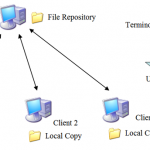Making the Switch from Paper to Digital Medical Records
Whatever medical field of human services your organization works in, if you have not yet made the switch from paper to digital records, you are falling behind the times. Changing to digital medical records has many benefits to help your organization run more smoothly and efficiently. Here are some of the key things you need to know about.

Image source: https://pixabay.com/photos/office-business-men-businessmen-1209640/
The Benefits of Making the Switch to Digital
There are many ways in which changing from paper to digital medical records can benefit your organization. One of the greatest advantages is the fact that having digital medical records makes finding specific records much quicker and easier. Rather than searching through countless paper files to find a certain record, staff members can find what they are looking for within seconds.
Storage is another reason for going digital. When you store paper medical records, your filing cabinets can take up whole rooms. By getting rid of the need for physical storage, your organization gains more space to use in other beneficial ways. Your organization could even downsize its premises to save money.
Another benefit of digital records is they are more secure. Sensitive and confidential records will be safer in the digital realm of the cloud and only specific users with different levels of accessibility will be able to access the relevant files.
If you use human services software, such as the excellent option from Foothold, you can further enhance your organization’s operations. By using software with full functionality for things like client tracking, case management, and treatment planning, your workflows will become streamlined and your daily operations will run much more efficiently.
Tips for Making the Switch from Paper to Digital Records
While making the switch to digital medical records will undoubtedly benefit your organization in the long run, the actual transition period can be challenging to implement, as is the case with any major upheaval to operations. Here are some tips to help the transition run smoothly.
Plan Ahead and Include Staff Members from All Roles in the Planning Process
Once you have made the decision to change from paper records to digital ones, you need to put a film plan in place to ensure the transition goes as smoothly as possible. Look at your workflow and determine what it will look like without paper documents. You will need to think about things like introducing computers and scanners and ensure all departments are coordinated and on the same page. It is important you involve staff members from all roles within your organization in the planning and rollout stages to ensure the change goes well. Training your staff members in how to use your new system is, of course, of the utmost importance.
Stick to Your Designated Transition Timeframe
As part of your plan, you need to work out how long your transition period will take. Create milestones and ensure that they are reached so that you can accomplish everything as planned within your chosen timeframe. The exact timeframe will depend on the needs of your specific organization, but most switches from paper to digital can be successful within the period of one month. The important thing is you stick to your planned time frame.
Tweak Workflows as the New System Is Rolled Out
Even with the best workflow plan in place for using the new digital records system, you will not know precisely how everything will run until your staff members are using the new system. So, in the early days of the transition, make sure you evaluate every element to gain the best workflows possible. New processes often require refinement, so do not be worried about needing to tweak your workflow as your organization begins using digital medical records.








![Travelling with your E-cigarettes [Infographic]](https://technofaq.org/wp-content/uploads/2017/10/Travelling_with_your_E-cigarettes-150x150.png)







